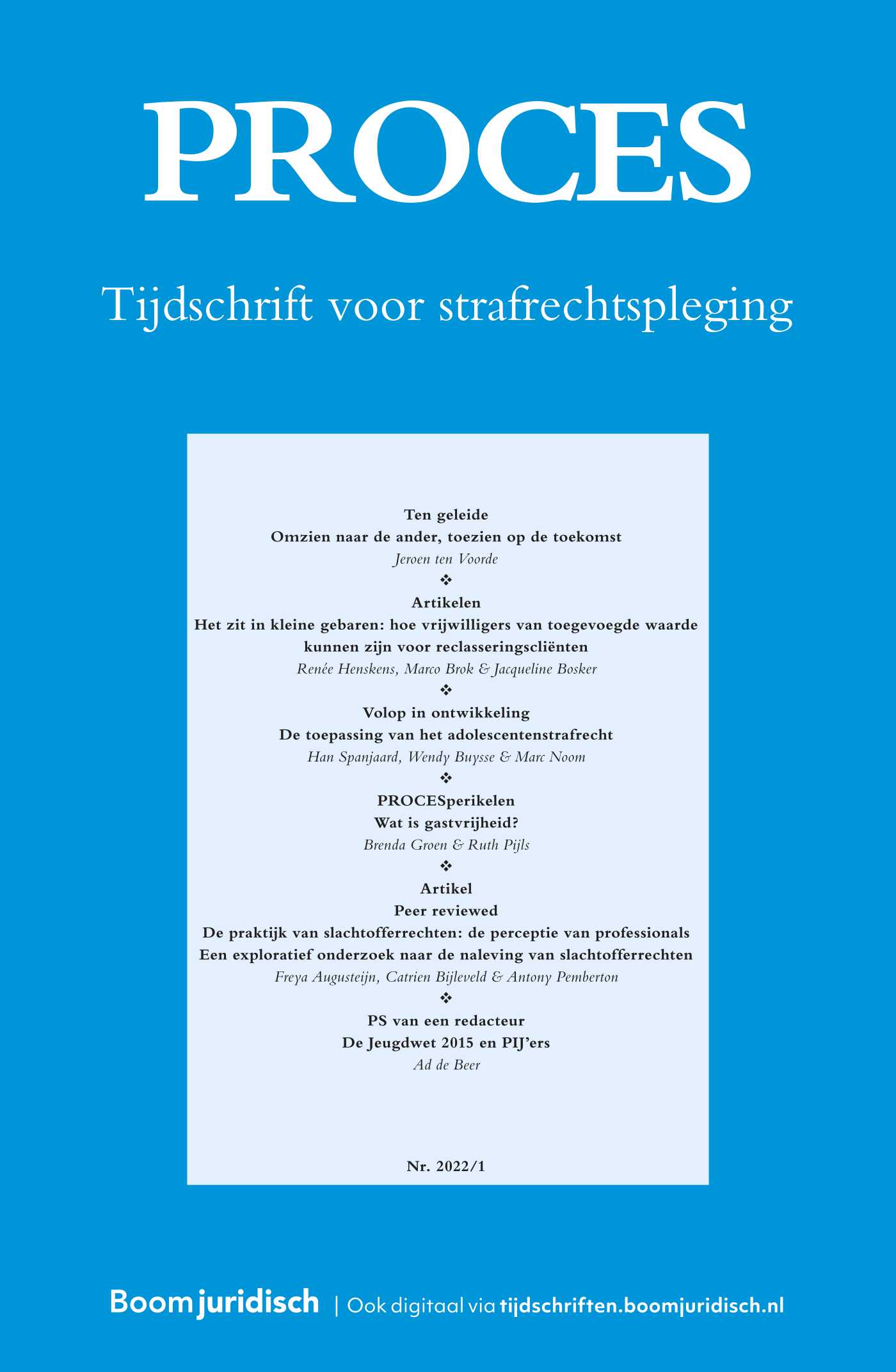|
Verslag van de PROCES-studiedag. |


PROCES
Meer op het gebied van Criminologie en veiligheid
Over dit tijdschriftMeld u zich hier aan voor de attendering op dit tijdschrift zodat u direct een mail ontvangt als er een nieuw digitaal nummer is verschenen en u de artikelen online kunt lezen.
| Redactioneel |
Gevolgen van de VOG: niet aan de bak, maar erin? |
| Auteurs | Mr. drs. Sigrid van Wingerden |
| Auteursinformatie |
| Artikel |
‘Gestraft’ na de straf: justitiële documentatie en de Verklaring Omtrent het GedragVerslag PROCES-studiedag |
| Trefwoorden | PROCES-studiedag |
| Auteurs | Astrid Bentvelzen, Celesta Bonnet, Laura Felderhof e.a. |
| SamenvattingAuteursinformatie |
| Artikel |
De beoordeling van een VOG-aanvraag |
| Trefwoorden | declaration of good conduct, integrity, screening, moral policy |
| Auteurs | Mr. drs. Roy Wildemors |
| SamenvattingAuteursinformatie |
|
In this article, Roy Wildemors explains how the Central Organisation for Certificates of Good Conduct decides on an application for a certificate of good conduct (CGC). First, it is determined whether the applicant has a criminal record that is relevant to the purpose for which the CGC has been applied for. If he does not have one, the CGC will be granted. If he has, specific personal circumstances will be taken into account, e.g. the number of antecedents, his age and the time that has passed since his last antecedent. Finally, his interests will be balanced against those of society. |
| Artikel |
Verklaring Omtrent het GedragTour d’horizon door de jurisprudentie |
| Trefwoorden | declaration of good conduct, judicial procedure, jurisprudence, screening |
| Auteurs | Mr. Jop Spijkerman |
| SamenvattingAuteursinformatie |
|
As a result of the workshop ‘Decision making VOG’, this article provides an overview of the relevant case-law regarding the issuing of a certificate of good conduct. This article especially focuses on the way an application of a certificate is being judged by the authorities (the COVOG) and later on the judge(s) using the objective and subjective criteria summed up in the ‘policy guideline VOG’. If possible, the article provides tips and tricks for applicants (and lawyers) regarding the application of a certificate of good conduct and the judicial procedure after the issuance is refused. |
| Praktijk |
Toezicht van de Inspectie van het Onderwijs op de Verklaring Omtrent het Gedrag |
| Auteurs | Drs. Liesbeth van Klaveren |
| Auteursinformatie |
| Artikel |
‘Gestraft’ na de strafLegitimiteit en proportionaliteit van juridische belemmeringen na afloop van de straf |
| Trefwoorden | Certificate of good conduct, wet justitiële en strafvorderlijke gegevens, collateral sentencing, disqualifications |
| Auteurs | Prof. dr. Miranda Boone |
| SamenvattingAuteursinformatie |
|
In this contribution the question is addressed how measures that aim to hold ex-convicts from occupying certain jobs and positions can be justified and what their limitations are. In the literature on collateral sentencing in particular four conditions are stressed. First, the vulnerable character of the occupation or activity involved. Second, there should be a strong relation between the conviction and the risk that has to be avoided. Third, collateral consequences should be individualized and only be imposed against those posing specific and demonstrable risks. Finally, a broad proportionality test should be applied on them, harsh civil disqualification should not be applied for relatively minor offences and burdensome restrictions may not be imposed in order to prevent relatively trivial risks. This theoretical model is applied on the regulation and practice of the Dutch conduct certificate. |
| Artikel |
Jeugdzonde, eeuwig zonde?Een onderzoek naar de beoordelingswijze van Verklaring Omtrent het Gedrag-aanvragen van jongeren |
| Trefwoorden | juvenile ex-offenders, collateral sentencing, conduct certificate, legitimacy |
| Auteurs | Elina Kurtovic |
| SamenvattingAuteursinformatie |
|
This study aims to examine the practice of the decision making on conduct certificate requests of juvenile ex-offenders, as there has not been done any empirical research on this topic so far. 57 cases are studied in order to answer the question whether the decision making meets the legal and penological justifications for collateral sentencing. Conclusion is the decisions are not proportional as to the seriousness of the risks which are aimed to be prevented and the relation between the past convictions and the desired job. Moreover, the requests are being individually assessed, yet more weight should be attached to the age, interests and positive developments of juvenile ex-offenders. Only then, the decisions can be regarded legitimate and proportional and do hinder juvenile ex-offenders’ successful reintegration into society. |
| Artikel |
De VOG en minderjarige wetsovertreders |
| Trefwoorden | juveniles, criminal records, reintegration, juvenile justice |
| Auteurs | Prof. mr. drs. Mariëlle Bruning |
| SamenvattingAuteursinformatie |
|
Juvenile offenders are confronted with criminal records. When they want to start education, work or an internship after detention, they often need a certificate of good conduct. In the Netherlands in recent years it has become more difficult for youth offenders to receive this certificate; criminal records have a detrimental impact, in particular for sex offenders. International juvenile justice standards stress the importance of the right of youngsters to social reintegration and protection of the right to privacy and should lead to an adjustment of this policy of repression. |
| Column |
Jaren zonder?Seksualiteit en intimiteit achter de tralies |
| Trefwoorden | column |
| Auteurs | Dr. Jaap van Vliet |
| SamenvattingAuteursinformatie |
|
In a column a journal editor or an author expresses his or her opinion on a particular subject. |
